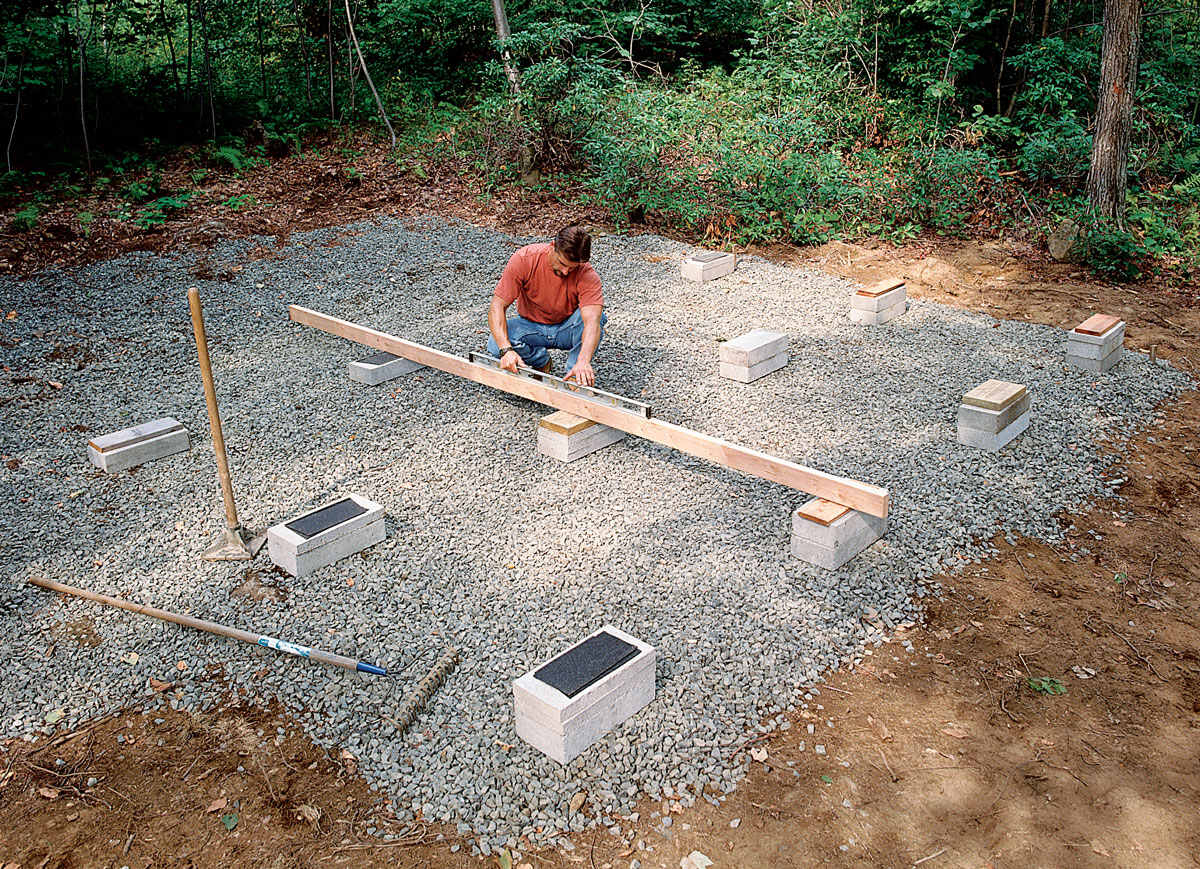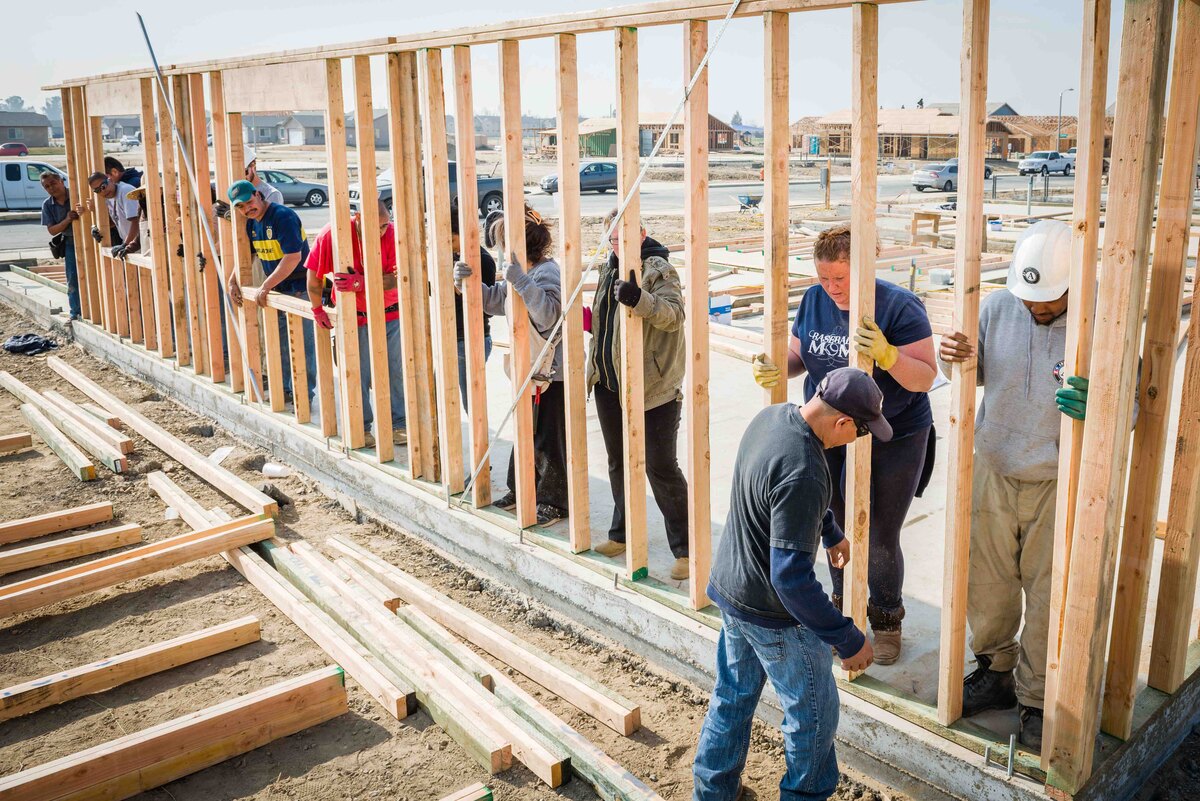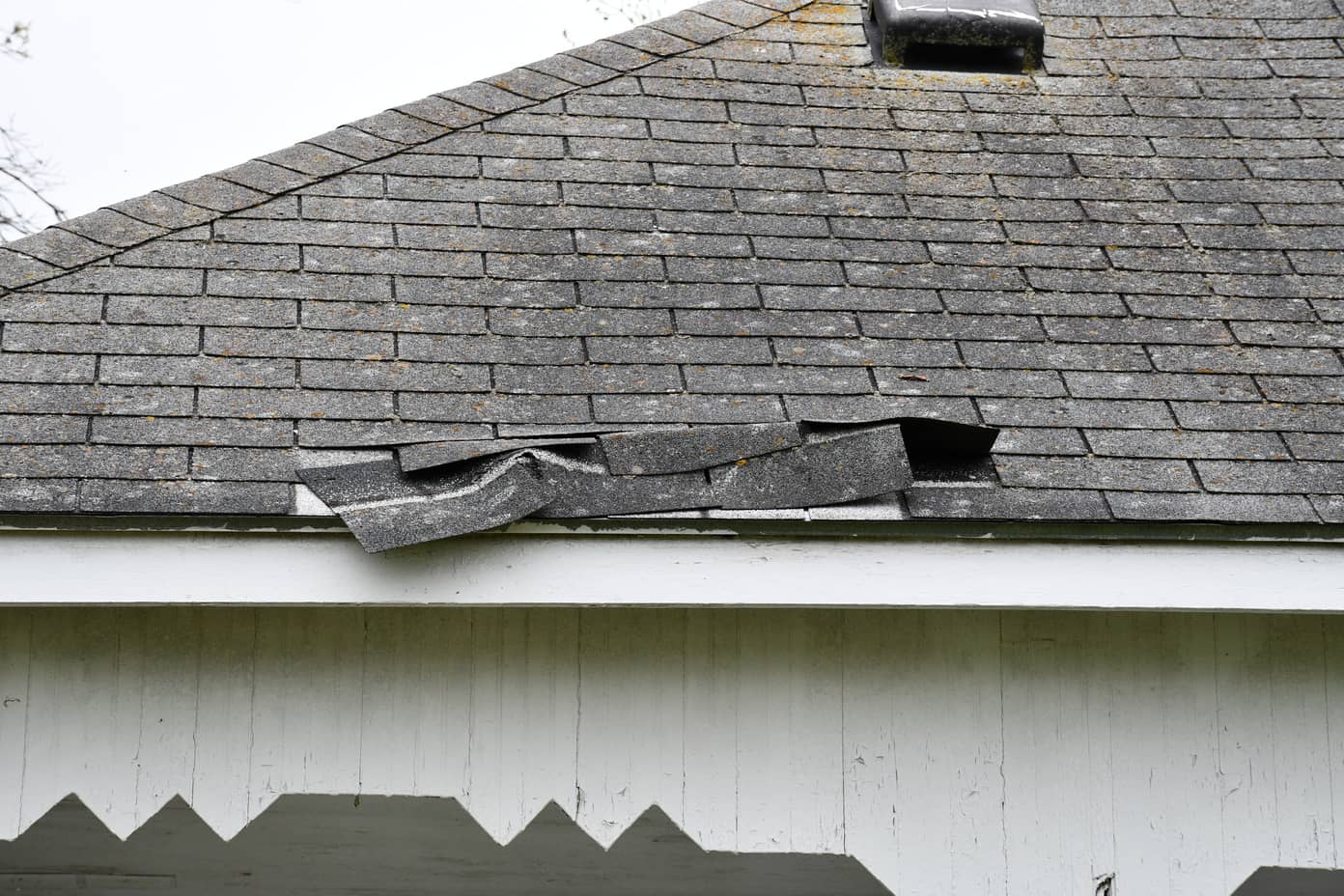Home>diy>Building & Construction>Do You Need A Realtor When Building A Home


Building & Construction
Do You Need A Realtor When Building A Home
Modified: December 7, 2023
Discover the benefits of hiring a realtor when undertaking a building construction project. Get expert guidance and save time and money.
(Many of the links in this article redirect to a specific reviewed product. Your purchase of these products through affiliate links helps to generate commission for Storables.com, at no extra cost. Learn more)
Introduction
Building a home from scratch is an exciting endeavor that allows you to customize every aspect of your living space. From the floor plan to the finishes, creating your dream home is a truly rewarding experience. However, the process can be overwhelming, filled with countless decisions and obstacles along the way. That’s where a realtor can be your guiding light and trusted advisor.
Contrary to popular belief, realtors aren’t just for buying and selling existing homes. They can also provide invaluable assistance when it comes to building a home from the ground up. Whether you’re a first-time home builder or have experience in construction, having a realtor by your side can make a world of difference.
In this article, we’ll explore the benefits of having a realtor when building a home and how they can navigate you through the intricate construction process. From finding the ideal land to connecting with reliable builders, negotiating contracts, and ensuring timely completion, a realtor can be the key to a successful and stress-free home building experience.
So, let’s dive in and discover why you need a realtor when embarking on your home building journey. Whether it’s your forever home, a vacation retreat, or an investment property, a realtor can provide invaluable expertise and support every step of the way.
Key Takeaways:
- Realtors bring extensive knowledge, industry connections, and negotiation skills to the home building process. They streamline finding land, connecting with professionals, obtaining permits, and managing finances, ensuring a smooth and successful construction journey.
- With a realtor’s expertise, home builders can confidently navigate potential issues, ensure timely completion, and maintain quality control. Realtors act as advocates, guiding homeowners through each step and ensuring their vision is brought to life.
Benefits of Having a Realtor When Building a Home
Building a home is a complex and time-consuming process. From selecting the right location to overseeing construction, there are numerous decisions and tasks to handle. Having a realtor by your side can provide a multitude of benefits that can make the process smoother and more efficient. Here are some of the key advantages of having a realtor when building a home:
1. Expert Guidance: Realtors have extensive knowledge and experience in the construction industry. They possess a deep understanding of the local market, trends, and regulations. With their expertise, they can guide you through the entire home building process, ensuring you make informed decisions at every stage.
2. Access to Resources: Realtors have a vast network of contacts in the construction industry, including builders, contractors, architects, and suppliers. They can connect you with trusted professionals who have a proven track record of delivering quality work. This access to resources can save you time and effort in finding reliable and skilled individuals for your project.
3. Finding the Perfect Location: Choosing the right piece of land is crucial when building a home. A realtor can help you identify the best locations that align with your needs, preferences, and budget. They will consider factors such as proximity to amenities, schools, transportation, and future development plans to ensure you select a location that meets your requirements.
4. Negotiating Contracts and Pricing: Realtors are skilled negotiators and can help you navigate the complexities of contracts and pricing. They will review and analyze the terms and conditions of contracts, ensuring they protect your interests. Realtors can also assist in negotiating the best prices with builders and contractors, helping you get the most value for your investment.
5. Handling Permits and Regulations: Building a home involves obtaining various permits and adhering to local regulations. Realtors are well-versed in the permit application process and can help you navigate the bureaucratic hurdles. They will ensure all necessary permits are obtained promptly and that your construction project complies with all building codes and regulations.
6. Ensuring Timely Completion: Realtors understand the importance of timely construction completion. They will monitor the progress of your project, ensuring that timelines are met and that construction stays on track. If there are any delays or issues, a realtor can intervene and work with the builders to find prompt resolutions, ensuring your dream home is completed within the agreed-upon timeframe.
7. Quality Control: Building a home requires attention to detail and strict quality control. Realtors can oversee the construction process, ensuring that high-quality materials and craftsmanship are used throughout the project. They will conduct inspections to identify any deficiencies or areas that require improvement, ensuring that your home is built to the highest standards.
8. Financial Guidance: Realtors have a comprehensive understanding of the financial aspect of building a home. They can help you navigate the complexities of financing, assisting you in securing the necessary funds and exploring potential financing options. Realtors can also provide guidance on budgeting and cost management to help you stay within your financial means.
Having a realtor by your side when building a home can provide peace of mind and ensure a seamless and successful construction process. Their expertise, resources, and support can save you time, money, and stress, empowering you to create the home of your dreams. So, consider enlisting the assistance of a realtor to make your home building journey a smooth and rewarding one.
Understanding the Construction Process
Building a home involves a series of steps that must be followed for a successful construction project. Understanding the construction process is essential for homeowners, and having a realtor can provide valuable insights and guidance throughout each stage. Here’s a breakdown of the typical construction process:
1. Design and Planning: The first step in building a home is designing and planning. During this phase, you’ll work with an architect or a design professional to create a blueprint that incorporates your vision and requirements. A realtor can help you find the right architect and provide input on design choices that may impact the home’s value and marketability.
2. Pre-construction Preparation: Once the design is finalized, the next step is to prepare for construction. This involves obtaining permits, securing financing, and finalizing contracts with the builder and various contractors. A realtor can guide you through the necessary paperwork, ensuring compliance with local regulations and helping with negotiations to get the best terms and pricing.
3. Site Preparation: Before construction can begin, the building site must be prepared. This includes clearing the land, leveling the terrain, and ensuring proper drainage. A realtor can assist in evaluating the land for potential issues such as soil quality, geological conditions, and environmental factors. They can also connect you with professionals who can conduct soil testing and surveys.
4. Foundation: The foundation is the base on which the entire structure will rest. This step involves excavating the site, pouring concrete, and constructing the foundation walls. A realtor can monitor the foundation construction to ensure it is done according to specifications and regulations, ensuring the stability and longevity of your home.
5. Framing: Once the foundation is in place, the framing stage begins. This involves constructing the structural framework of the home using wood or steel. Walls, floors, and the roof are built during this phase. A realtor can have an eye for detail and quality control, ensuring that the framing meets building codes and that the structure is sturdy and sound.
6. Mechanical Systems: The next step is the installation of mechanical systems, such as HVAC, plumbing, and electrical. Cooperation between the builder, contractors, and realtor is crucial here to ensure that these systems are placed correctly and meet safety standards. A realtor can act as a liaison between you and the contractors, ensuring that everything is installed as per plan and up to code.
7. Interior Finishes: Once the infrastructure is in place, it’s time to focus on the interior finishes. This includes installing drywall, flooring, cabinetry, fixtures, and painting. A realtor can provide guidance on choosing materials and finishes that align with your preferences and market trends. They can also help coordinate with interior designers or decorators to ensure a cohesive and aesthetically pleasing look.
8. Final Inspections and Completion: Before moving into your newly built home, it’s essential to undergo final inspections to ensure everything is up to code and meets safety requirements. A realtor can arrange for these inspections and ensure any necessary corrections are made. Once the inspections are cleared, the home is ready for occupancy, and the construction process is complete.
By understanding the construction process, you can anticipate each step and make informed decisions along the way. Having a realtor as your guide and advocate throughout this process can help streamline the construction journey and ensure the successful realization of your dream home.
Finding and Evaluating Land for Building
Finding the perfect piece of land is a crucial step in the home building process. The location, size, and characteristics of the land will greatly impact the design, construction, and overall value of your home. Having a realtor by your side can help simplify the land search and ensure you make an informed decision. Here’s how a realtor can assist in finding and evaluating land for building:
1. Extensive Market Knowledge: Realtors have a deep understanding of the local real estate market. They are aware of the available land listings and have access to exclusive databases that may not be accessible to the general public. By working with a realtor, you can explore a wider range of land options that align with your preferences and budget.
2. Assessing Location: Location is key when it comes to building a home. A realtor can help you evaluate the suitability of a land parcel based on its proximity to amenities, schools, transportation, and future development plans. They will consider factors such as neighborhood characteristics, zoning restrictions, and any potential impacts on your daily life.
3. Evaluating Land Features: A realtor can assess the features and characteristics of the land to ensure it aligns with your building plans. They will consider factors such as topography, soil conditions, drainage, and access to utilities. By conducting a thorough evaluation, a realtor can identify any potential challenges or advantages the land may present for your construction project.
4. Environmental Considerations: Environmental factors can significantly impact the construction and livability of your home. A realtor can help identify any environmental concerns such as flood zones, protected habitats, or soil contamination. They can also assist in obtaining reports or conducting due diligence to ensure the land meets environmental standards and regulations.
5. Cost Analysis: Realtors have knowledge of land values and can provide insight into pricing trends and property appraisals. They can help you analyze the costs associated with purchasing the land, including any additional expenses such as surveys, permit fees, and utility hookups. With this information, you can make an informed decision regarding the financial feasibility of the land purchase.
6. Negotiation Assistance: When you find a land parcel that meets your requirements, a realtor can assist in negotiating the purchase. They can advocate for your best interests, help navigate the negotiation process, and work to secure the most favorable terms and price. By having a realtor by your side, you can leverage their negotiation skills to ensure a fair and smooth transaction.
7. Due Diligence: A realtor will guide you through the due diligence process, ensuring all necessary checks and inspections are conducted. This includes verifying property boundaries, surveying existing easements, and assessing the availability and accessibility of utilities. With their expertise, a realtor will help you avoid any potential legal or logistical complications associated with the land purchase.
Finding and evaluating land for building can be overwhelming, but with a realtor’s support, you can navigate the process confidently. Their market knowledge, expertise in assessing land features, and negotiation assistance are invaluable when it comes to securing the ideal land for your dream home. So, enlist the help of a realtor to streamline your land search and ensure a solid foundation for your home building project.
Connecting with Quality Builders and Contractors
Finding and working with reliable builders and contractors is crucial when building your dream home. The quality of their workmanship and their ability to meet your expectations can significantly impact the outcome of your construction project. With the guidance of a realtor, you can confidently connect with reputable builders and contractors who will bring your vision to life. Here’s how a realtor can assist in this process:
1. Extensive Network: Realtors have an extensive network of professionals in the construction industry. They have built relationships with builders, contractors, architects, and other tradespeople over the years. This network allows them to connect you with trusted individuals who have a proven track record of delivering quality work.
2. Qualified Recommendations: A realtor can provide you with a list of qualified builders and contractors based on your specific needs and preferences. They will consider factors such as the type of home you want to build, your budget, and any specialized requirements you may have. This saves you time and effort in researching and screening potential builders.
3. Background Checks: Realtors have experience in evaluating the background and credentials of builders and contractors. They can conduct thorough checks, including verifying licenses, certifications, and insurance coverage. This ensures that you work with professionals who meet all legal requirements and have the necessary qualifications for your construction project.
4. Portfolio and References: A realtor can review the portfolios of builders and contractors to assess the quality of their previous work. They can also provide you with references from past clients, allowing you to gain insights into the builder’s communication, reliability, and workmanship. This information is invaluable in making an informed decision about who to hire.
5. Price Negotiation: Realtors are skilled negotiators and can help you secure competitive pricing from builders and contractors. They understand the market dynamics and can leverage their knowledge and relationships to negotiate the best possible rates for your project. This ensures that you receive fair pricing without compromising on the quality of the work.
6. Contract Review: A realtor can review the contracts and agreements between you and the builders or contractors. They will ensure that the terms and conditions protect your interests and that all essential elements are included, such as project scope, timeline, payment schedule, and warranty provisions. This helps you avoid any potential legal or financial pitfalls down the road.
7. Ongoing Support: Throughout the construction process, a realtor can serve as a liaison between you and the builders or contractors. They can facilitate communication, address any concerns or issues that arise, and ensure that the project stays on track. This ongoing support helps maintain a positive working relationship and ensures that your expectations are met.
Connecting with quality builders and contractors plays a pivotal role in the success of your home building project. With the assistance of a realtor, you can tap into their network, receive qualified recommendations, and navigate the process with confidence. Their expertise in vetting professionals, negotiating contracts, and providing ongoing support will help you find the right team to bring your dream home to life. So, enlist the services of a realtor to connect you with reliable and skilled builders and contractors for a smooth and successful construction journey.
Negotiating Pricing and Contracts
When building a home, negotiating pricing and contracts is a critical step that can significantly impact your project’s overall cost and success. A realtor can play a vital role in this process, leveraging their expertise in negotiation strategies, market knowledge, and contract review to ensure you receive the best pricing and contractual terms. Here’s how a realtor can assist in negotiating pricing and contracts:
1. Market Analysis: Realtors have a deep understanding of the local real estate market and construction costs. They can conduct a market analysis to determine fair pricing for your construction project. This analysis takes into account factors such as local labor rates, material costs, and current market trends. With this information, a realtor can help you negotiate fair and competitive pricing with builders and contractors.
2. Building Relationships: Realtors have well-established relationships with builders and contractors, giving them leverage when negotiating pricing. They can tap into their network to identify potential cost-saving opportunities and negotiate better rates on your behalf. These relationships can also help ensure that your project receives priority attention from the builders and contractors.
3. Multiple Bids: A realtor can advise you on obtaining multiple bids from different builders and contractors. This allows you to compare pricing and services to ensure you get the best value for your investment. Realtors can assist in reviewing and analyzing the bids, helping you identify any discrepancies or potential areas for negotiation.
4. Value Engineering: Value engineering is a process where a realtor works with builders and contractors to find cost-saving alternatives without compromising quality. They can collaborate with the professionals to identify areas where savings can be achieved through material choices, construction techniques, or design modifications. This helps optimize the project’s budget while maintaining your vision.
5. Contract Review: Realtors are well-versed in reviewing contracts and can ensure that your interests are protected. They will carefully examine the terms and conditions of the contract, including project scope, payment schedule, warranties, and dispute resolution mechanisms. Realtors can spot any potential pitfalls or ambiguous language and work with you to negotiate amendments or clarifications.
6. Timelines and Milestones: A realtor can incorporate realistic timelines and milestones into the contract to ensure that the builders and contractors adhere to the agreed-upon schedule. This includes setting clear expectations for project completion, payments, and any required inspections or approvals. By including these provisions in the contract, you can minimize delays and maintain accountability throughout the construction process.
7. Expert Negotiation Skills: Realtors are skilled negotiators who can advocate for your best interests. They know how to navigate delicate negotiations and reach mutually beneficial agreements with builders and contractors. Whether it’s negotiating pricing, change orders, or contract terms, a realtor will strive to ensure that you get the most favorable outcome.
Negotiating pricing and contracts is a crucial aspect of building a home. By enlisting the services of a realtor, you can tap into their market knowledge, negotiation skills, and contract expertise. Their guidance and support throughout this process will help you secure fair pricing, well-structured contracts, and ultimately, a successful and rewarding home building experience. So, consider working with a realtor to maximize your savings and protect your interests during the negotiation phase of your construction project.
It’s beneficial to have a realtor when building a home to help with negotiations, contracts, and navigating the process. They can also provide valuable market insights and help with potential resale value.
Managing Permits and Regulatory Requirements
When building a home, navigating the complex world of permits and regulatory requirements is essential. Failure to comply with local regulations can result in costly delays, fines, or even having to redo work. Fortunately, a realtor can guide you through this process, ensuring that all necessary permits are obtained and that your construction project meets all regulatory obligations. Here’s how a realtor can assist in managing permits and regulatory requirements:
1. Knowledge of Local Regulations: Realtors have in-depth knowledge of the local building codes, zoning regulations, and permit requirements. They stay up-to-date with any changes or updates in these regulations. This understanding allows them to guide you on what permits are needed for your specific construction project and ensure compliance with local laws.
2. Identifying Permitting Needs: Building a home typically requires several permits, such as building permits, plumbing permits, electrical permits, and more. A realtor can help you identify the specific permits you need based on your project’s scope and location. They can also assist in completing the necessary paperwork, ensuring that all required information is provided accurately and promptly.
3. Streamlining the Permit Application Process: Applying for permits can be a time-consuming and bureaucratic process. A realtor can guide you through the permit application process, ensuring that all required forms are completed, and supporting documentation is provided. They can also liaise with the local building department on your behalf, making the process smoother and more efficient.
4. Coordinating Inspections: Once permits are obtained, inspections will be required at various stages of the construction process. A realtor can help coordinate these inspections, ensuring that they are scheduled and conducted in a timely manner. They will work with the builders and contractors to ensure that the necessary work is completed and ready for inspection.
5. Ensuring Code Compliance: Building codes and regulations are designed to ensure the safety, structural integrity, and energy efficiency of homes. A realtor can act as a second set of eyes, working closely with builders and tradespeople to ensure that all work is conducted in accordance with the applicable building codes. They will monitor the construction process, highlighting any potential code violations and working with the builders to rectify them promptly.
6. Knowledge of Permit Fees and Timelines: Realtors have a good understanding of the fees associated with obtaining permits and can provide you with estimates of these costs. They can also inform you of the expected timelines for permit approvals and inspections, helping you plan your construction project accordingly.
7. Addressing Regulatory Challenges: In some cases, challenges may arise during the permit approval process, such as objections from neighbors or compliance concerns. A realtor can help navigate these challenges by liaising with the appropriate parties, providing supporting documentation, and finding solutions to ensure compliance while minimizing delays.
Managing permits and regulatory requirements requires expertise and attention to detail. By working with a realtor, you can rely on their knowledge and experience to navigate these complexities successfully. Their support throughout the permit process will help you stay on track, avoid unnecessary delays, and ensure that your construction project meets all legal and regulatory standards. So, consider enlisting the assistance of a realtor to manage permits and regulatory requirements for a smooth and compliant home building experience.
Ensuring Timely Completion and Quality Control
When building a home, ensuring timely completion and maintaining quality control are essential factors for a successful project. A realtor can play a crucial role in overseeing the construction process, monitoring progress, and ensuring that the work meets your expectations. Here’s how a realtor can assist in ensuring timely completion and quality control:
1. Project Management: A realtor can act as a project manager, overseeing the construction process from start to finish. They will coordinate with builders, contractors, and other professionals involved in the project to ensure that timelines are established and met. Realtors can develop a construction schedule, set milestones, and provide regular updates to keep the project on track.
2. Regular Site Visits: By conducting regular site visits, a realtor can monitor the progress of the construction. They will ensure that work is being carried out according to the agreed-upon plans and specifications. Realtors have an eye for detail and can identify any issues or potential areas of concern early on, preventing delays and costly rework.
3. Quality Control Inspections: Realtors can conduct quality control inspections at various stages of the construction process. They will assess the workmanship, materials used, and compliance with building codes and regulations. This ensures that the construction meets the highest standards of quality and provides peace of mind knowing that your home is being built to last.
4. Problem-Solving and Issue Resolution: Construction projects often encounter unexpected challenges or issues along the way. A realtor can act as a mediator between you and the builders/contractors, helping to resolve disputes or address any concerns that may arise during the construction process. Their experience and understanding of construction practices enable them to find solutions that are mutually beneficial for all parties involved.
5. Coordination with Subcontractors: Building a home involves coordination with various subcontractors, such as electricians, plumbers, and HVAC professionals. A realtor can streamline this coordination, ensuring that all subcontractors are scheduled appropriately and that their work is integrated seamlessly into the construction process. This coordination helps avoid delays and ensures efficient progress.
6. Timely Issue Identification: With their construction expertise, realtors can identify potential issues or deficiencies early on. By addressing these issues promptly, they can work with the builders and contractors to find suitable solutions without causing significant delays or compromising the quality of the construction.
7. Completion and Final Walkthrough: As the construction nears completion, a realtor can conduct a final walkthrough to ensure that all agreed-upon work has been completed to your satisfaction. Any remaining deficiencies or touch-ups can be identified and addressed before the final handover. Realtors can also assist in verifying that all required permits and inspections have been obtained and are in compliance with regulatory requirements.
Ensuring timely completion and maintaining quality control are fundamental to a successful home building project. By enlisting the assistance of a realtor, you can rely on their project management skills, attention to detail, and construction expertise to oversee every aspect of the construction process. Their involvement ensures that the work is completed on time, meets established standards, and helps bring your dream home to life. So, consider partnering with a realtor to ensure the timely completion and quality control of your home building project.
Handling Financing and Payment Arrangements
Handling financing and payment arrangements is a critical aspect of building a home. From securing the necessary funds to managing payments to builders and contractors, proper financial management is essential for a smooth construction process. A realtor can provide valuable guidance and support in navigating the financial aspects of your home building project. Here’s how a realtor can assist in handling financing and payment arrangements:
1. Understanding Financing Options: Realtors have a comprehensive understanding of the various financing options available for home building projects. They can help you explore different sources of funding, such as traditional mortgages, construction loans, or private financing. Realtors can provide insights into the pros and cons of each option, enabling you to make an informed decision based on your financial situation and objectives.
2. Connecting with Lenders: A realtor can connect you with lenders who specialize in financing new home construction. They have established relationships with lenders and can help facilitate the loan application process. Realtors can also assist in reviewing loan terms and conditions, ensuring that they align with your needs and providing guidance throughout the financing process.
3. Budgeting and Cost Management: Building a home involves careful budgeting and cost management to ensure that expenses are kept under control. A realtor can assist in creating a realistic budget for your construction project, taking into account various factors such as materials, labor, permits, and contingencies. They can also provide advice on cost-saving measures without compromising the quality of the home.
4. Payment Schedule: Realtors can help you establish a payment schedule with builders and contractors. This includes determining the frequency and amount of payments based on the progress of the construction. By setting clear expectations for payment, you can maintain a positive working relationship with the builders and contractors and ensure that payments are made on time to avoid potential delays or disputes.
5. Escrow Services: A realtor can facilitate the use of escrow services to protect your financial interests during the construction process. Escrow services act as an intermediary, holding funds until certain conditions or milestones are met. This ensures that payments are released only when specific work is completed and meets your satisfaction, providing an added layer of financial security.
6. Change Orders and Cost Adjustments: Changes or modifications to the original construction plan may arise during the building process, resulting in additional costs. A realtor can help manage change orders, ensuring that any cost adjustments are clearly communicated and documented. They will work with you and the builders/contractors to negotiate fair pricing for these changes, ensuring transparency and preventing financial surprises.
7. Financial Monitoring: Throughout the construction process, a realtor can help monitor and track expenses to ensure that they align with the established budget. They can review invoices and statements from builders and contractors, verifying the accuracy of charges and preventing any potential financial discrepancies. This ongoing financial monitoring helps you maintain control over costs, avoiding any unnecessary surprises.
Handling financing and payment arrangements requires careful planning, negotiation, and attention to detail. By working with a realtor, you can leverage their expertise in financial management and construction financing. Their guidance throughout the process will help you secure appropriate funding, establish a sound payment schedule, and ensure that financial aspects are effectively managed from start to finish. So, consider partnering with a realtor to handle financing and payment arrangements for a stress-free and well-managed home building experience.
Read more: When Do You Need Towing Mirrors
Dealing with Potential Issues and Resolving Disputes
During the home building process, it’s not uncommon for potential issues or disputes to arise. Dealing with these challenges promptly and effectively is critical to maintaining the progress and quality of your construction project. A realtor can play a crucial role in navigating and resolving potential issues and disputes, ensuring a smooth and successful home building experience. Here’s how a realtor can assist in dealing with potential issues and resolving disputes:
1. Mediation and Communication: A realtor can serve as a mediator in resolving potential issues or disputes between you and the builders or contractors. They can facilitate open and honest communication between all parties involved, encouraging dialogue and negotiation to reach mutually agreeable solutions. Realtors are skilled at diffusing tense situations and finding common ground.
2. Identifying Issues Early: With their experience and attention to detail, realtors can identify potential issues or red flags early on in the construction process. Whether it’s a miscommunication, a deviation from the agreed-upon plans, or a quality concern, a realtor can spot these issues and address them promptly. By addressing issues early, potential conflicts can be mitigated or prevented.
3. Liaison with Builders and Contractors: Realtors act as a liaison between you and the builders/contractors throughout the construction process. They can effectively communicate your concerns and expectations to ensure that issues are addressed promptly and correctly. Realtors can advocate for your interests, working with the builders/contractors to find suitable solutions and reach a resolution.
4. Problem-Solving Expertise: Realtors are trained to think creatively and find solutions to complex problems. When faced with an issue or dispute, they can offer alternative suggestions and strategies to resolve the situation. Realtors can draw on their extensive experience in the construction industry to provide insights and advice on the best course of action.
5. Legal Referrals: In cases where disputes escalate and legal action becomes necessary, realtors can provide referrals to reputable attorneys who specialize in construction law. They can guide you through the legal process, ensuring that your rights are protected and the dispute is resolved in a fair and lawful manner.
6. Documentation and Evidence: Realtors understand the importance of documentation and evidence in resolving disputes. They can assist in documenting any discrepancies, changes, or disputes throughout the construction process. This may include taking photographs, keeping records of communication, and retaining written documentation. Such evidence is valuable in supporting your position should a dispute arise.
7. Focus on Customer Satisfaction: Realtors prioritize customer satisfaction and will work diligently to ensure that your concerns are addressed to your satisfaction. They will advocate for the quality and completion of the construction project in line with your expectations. Realtors strive to create a positive and successful home building experience, even in the face of potential issues or disputes.
Dealing with potential issues and resolving disputes requires effective communication, problem-solving skills, and a commitment to finding satisfactory resolutions. By partnering with a realtor, you can rely on their expertise in managing conflicts and their dedication to protecting your interests. Their guidance and support will navigate any potential challenges, minimizing disruptions, and ensuring the successful completion of your dream home. So, consider working with a realtor to effectively deal with potential issues and resolve disputes during your home building journey.
Conclusion
Building a home is a significant undertaking that requires careful planning, attention to detail, and expertise in various aspects of the construction process. Having a realtor by your side can provide invaluable support and guidance, making the home building journey smoother and more successful.
Throughout this article, we have explored the numerous benefits of having a realtor when building a home. From finding the perfect piece of land to connecting with reliable builders and contractors, negotiating pricing and contracts, managing permits and regulatory requirements, ensuring timely completion and quality control, handling financing and payment arrangements, and dealing with potential issues and resolving disputes, a realtor’s expertise is invaluable.
Realtors bring extensive market knowledge, industry connections, and negotiation skills to the table. They can streamline the process of finding land, connecting with reliable professionals, obtaining permits, and managing various financial aspects. Realtors are adept at problem-solving and communication, ensuring that potential issues and disputes are swiftly resolved.
Ultimately, a realtor’s goal is to make your home building journey as smooth and stress-free as possible. They act as your advocate, guiding you through each step and ensuring that your vision is brought to life while considering your budget and needs. With their expertise, you can have confidence in the decisions you make and trust that your dream home will be built to the highest standards.
So, if you’re embarking on a home building project, consider enlisting the services of a realtor. Their deep knowledge of the construction industry, connections, negotiation skills, and ability to navigate the complexities of the process will prove invaluable. With a realtor by your side, you can enjoy the exciting journey of building your dream home, confident that you have a trusted advisor supporting you every step of the way.
In conclusion, don’t underestimate the value that a realtor brings to the table when building a home. Their expertise, resources, and support can make a world of difference, ensuring the successful realization of your vision. So, partner with a realtor and embark on your home building journey with confidence and peace of mind.
Frequently Asked Questions about Do You Need A Realtor When Building A Home
Was this page helpful?
At Storables.com, we guarantee accurate and reliable information. Our content, validated by Expert Board Contributors, is crafted following stringent Editorial Policies. We're committed to providing you with well-researched, expert-backed insights for all your informational needs.














0 thoughts on “Do You Need A Realtor When Building A Home”